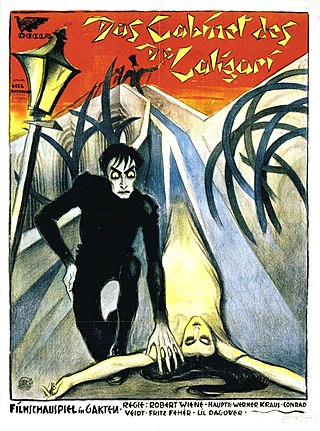
The Cabinet of Dr. Caligari is a 1920 German silent horror film, directed by Robert Wiene and written by Hans Janowitz and Carl Mayer. Considered the quintessential work of German Expressionist cinema, it tells the story of an insane hypnotist who uses a brainwashed somnambulist to commit murders. The film features a dark and twisted visual style, with sharp-pointed forms, oblique and curving lines, structures and landscapes that lean and twist in unusual angles, and shadows and streaks of light painted directly onto the sets.

Hans Walter Conrad Veidt was a German actor. He attracted early attention for his roles in the films Different from the Others (1919), The Cabinet of Dr. Caligari (1920), and The Man Who Laughs (1928). After a successful career in German silent films, where he was one of the best-paid stars of UFA, Veidt and his new Jewish wife Ilona Prager left Germany in 1933 after the Nazis came to power. The couple settled in Britain, where he took citizenship in 1939. He appeared in many British films, including The Thief of Bagdad (1940), before emigrating to the United States around 1941, which led to his being cast in what may be his best remembered role as Major Strasser in Casablanca (1942). This was Veidt's last film role to be released during his lifetime.

Robert Wiene was a German film director, screenwriter and producer, active during the silent era. He is widely-known for directing the landmark 1920 film The Cabinet of Dr. Caligari and a succession of other expressionist films. Wiene also directed a variety of other films of varying styles and genres. Following the Nazi rise to power in Germany, Wiene, who was of Jewish descent, fled into exile.

Der Januskopf is a 1920 German silent film directed by F. W. Murnau, and starring Conrad Veidt. The film was an adaptation of Robert Louis Stevenson's 1886 novella The Strange Case of Dr. Jekyll and Mr. Hyde. Little is known about the production; it was shot and previewed under the title Schrecken with production starting in either February or March 1920.
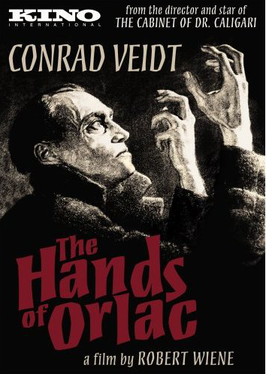
The Hands of Orlac is a 1924 Austrian silent film directed by Robert Wiene and starring Conrad Veidt, Alexandra Sorina and Fritz Kortner. It is based on the novel Les Mains d'Orlac by Maurice Renard.

Satan is a 1920 silent German drama film in three parts, directed by F. W. Murnau, written and produced by Robert Wiene. It was one of Murnau's first directorial attempts, and along with his 1920 Der Januskopf, is today considered a lost film. The film starred Fritz Kortner, Sadjah Gezza and Conrad Veidt. Karl Freund was the cinematographer.
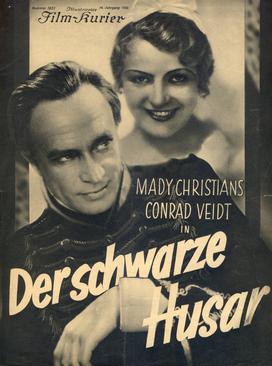
The Black Hussar is a 1932 German historical drama film directed by Gerhard Lamprecht and starring Bernhard Goetzke, Conrad Veidt, Mady Christians, and Wolf Albach-Retty. It premièred at the Ufa-Palast am Zoo on 12 October 1932, part of a whole string of 'patriotic' movies released in the late days of the Weimar Republic.

Rasputin, Demon with Women is a 1932 German drama film directed by Adolf Trotz and starring Conrad Veidt, Paul Otto and Hermine Sterler. It was shot at the Halensee Studios and Terra Studios in Berlin. The film's sets were designed by the art directors Gustav A. Knauer and Walter Reimann. It portrays the influence wielded by Grigori Rasputin over the Russian Royal Family around the time of the First World War. It was released the same year as an American film about him Rasputin and the Empress. Felix Yusupov sued the filmmakers for his portrayal, but ultimately dropped his case. The film was banned in Germany in 1933 following the Nazi Party's rise to power.
The Wandering Light is a 1916 German silent drama film directed by Robert Wiene and starring Henny Porten, Bruno Decarli and Theodor Becker. It was based on a short story by Ernst von Wildenbruch. A Count marries a woman who come to wrongly believe that he is mad.

Bruno Decarli was a German stage and film actor.
The Homecoming of Odysseus is a 1918 German silent comedy film directed by Rudolf Biebrach and starring Henny Porten, Bruno Decarli and Arthur Bergen.
Life Is a Dream is a 1917 German silent drama film directed by Robert Wiene and starring Emil Jannings, Bruno Decarli and Maria Fein. A young aristocrat meets a man and marries him, but soon discovers he is a monster. After his death she grows increasingly mad, until a revolutionary new cure is attempted which makes her believe that the whole episode was simply a dream.
The Man in the Mirror is a 1917 German silent drama film directed by Robert Wiene and starring Maria Fein, Bruno Decarli and Emil Rameau.
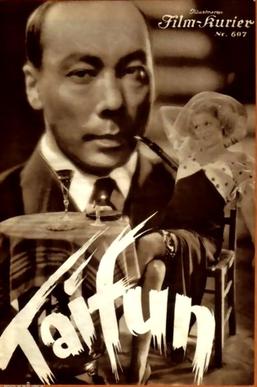
Typhoon is a 1933 German drama film directed by Robert Wiene and starring Liane Haid, Viktor de Kowa and Valéry Inkijinoff. It was based on the 1911 play Typhoon by the Hungarian writer Melchior Lengyel. It was the last German film made by Wiene, who had been a leading director of German silent cinema.
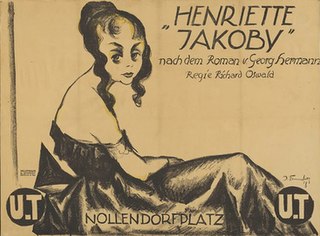
Henriette Jacoby is a 1918 German silent film directed by Richard Oswald and starring Mechthildis Thein, Conrad Veidt and Leo Connard. It is the sequel to Jettchen Gebert's Story. It is a lost film.

Jettchen Gebert's Story is a 1918 German silent film directed by Richard Oswald and starring Mechthildis Thein, Conrad Veidt and Leo Connard. It is a lost film.

Unheimliche Geschichten, titled Eerie Tales in English, is a 1919 German silent anthology film directed by Richard Oswald and starring Conrad Veidt. The film is split into five stories: The Apparition, The Hand, The Black Cat, The Suicide Club and Der Spuk.

The Ringwall Family is a 1918 German silent drama film directed by Rudolf Biebrach and starring Henny Porten, Bruno Decarli and Kurt Vespermann.
Victim of Society is a 1919 German silent drama film directed by Willy Grunwald and starring Conrad Veidt and Kurt Brenkendorf. Originally shot in 1918, the film was not released until 1919. It is now considered a lost film.
The Japanese Woman is a 1919 German silent mystery film directed by Ewald André Dupont and starring Max Landa, Manja Tzatschewa and Conrad Veidt.














